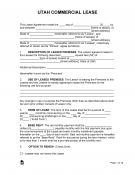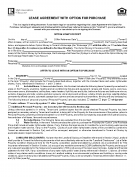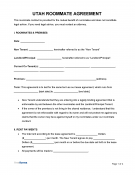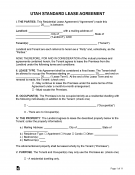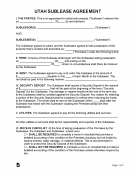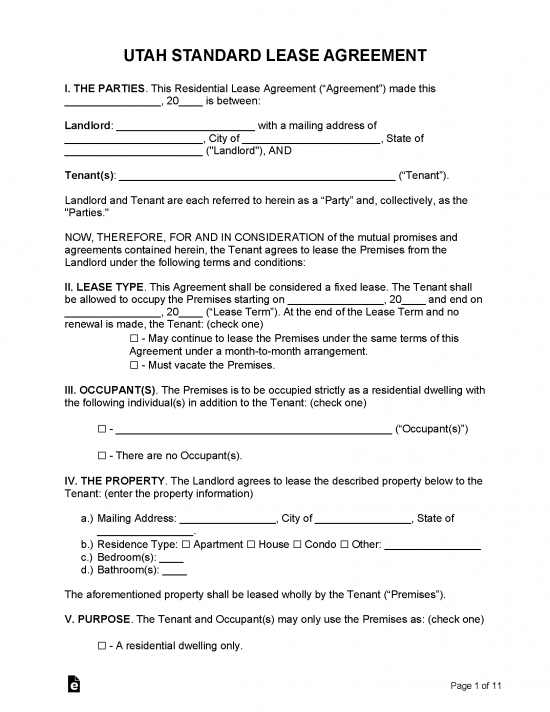Utah lease agreements govern a tenant’s residence in a landlord’s property in exchange for monthly rent. The lease agreement will contain essential terms, such as monthly rent and responsibility for utilities, as well as optional items like a smoking or pet policy. Both the landlord and the tenant should keep a copy of the lease agreement and regard it as their first resource for understanding their rights and obligations under the lease.
Contents
By Type (6)
- Commercial Lease Agreement
- Month-to-Month Lease Agreement
- Rent-to-Own Lease Agreement
- Roommate Lease Agreement
- Standard Lease Agreement
- Sublease Agreement
Download: Adobe PDF, MS Word, Rich Text Format
Download: Adobe PDF, MS Word, Rich Text Format
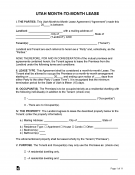 Month-to-Month Lease Agreement
Month-to-Month Lease Agreement
Download: Adobe PDF, MS Word, Rich Text Format
Download: Adobe PDF, MS Word, Rich Text Format
Download: Adobe PDF, MS Word, Rich Text Format
Download: Adobe PDF, MS Word, Rich Text Format
Landlord-Tenant Laws
Statutes – Title 57, Chapters 17 (Residential Renters’ Deposits) and 22 (Fit Premises Act)
Required Disclosures (2)
Lead-Based Paint Disclosure – For leases of properties with dwelling units erected before 1978, federal law mandates that landlords provide tenants with information about the risks associated with lead-based paints.
Move-in Checklist – Landlords must, before the signing of the lease agreement, either provide tenants with a “move-in checklist” detailing the condition of various parts of the property or provide tenants with a written report on the conditions of the various parts of the property. This checklist or report will be used at the conclusion of the lease to determine how much of a tenant’s security deposit, if any, a landlord is entitled to (§ 57-22-4(6)).
Security Deposit Laws
Maximum Amount ($)
In Utah, there is no maximum security deposit amount that a landlord may charge.
Returning to Tenant
If a landlord desires to make a portion of a security deposit non-refundable, this must be explicitly and conspicuously stated in the lease agreement. Otherwise, within at most thirty (30) days after the termination of a tenancy, the landlord must return the security deposit to the tenant. The landlord may retain all or a portion of the deposit in order to settle owed rent, clean or repair damage to the dwelling unit beyond normal wear and tear, or account for tenant breaches of obligations specifically identified in the rental agreement.
In the event that a tenant does not receive the amount to which he or she is entitled with the landlord, the tenant may serve the landlord with a Tenant’s Notice to Provide Deposit Disposition (§57-17-3).
When is Rent Due? (grace period)
Utah law does not set a date on which monthly rent is due, nor does it mandate a grace period, meaning that landlords and tenants may determine when rent is due in the lease agreement.
Eviction Notice (non-payment)
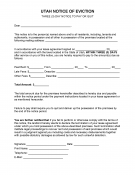 3-Day Notice to Pay or Quit – If a tenant fails to pay rent on the date it is due, the landlord has the right to provide the tenant with a three-day notice to pay or quit. If the rent is not paid, in full, within three days of delivering the notice, the landlord may the right to terminate the lease and begin eviction proceedings (§78B-6-802).
3-Day Notice to Pay or Quit – If a tenant fails to pay rent on the date it is due, the landlord has the right to provide the tenant with a three-day notice to pay or quit. If the rent is not paid, in full, within three days of delivering the notice, the landlord may the right to terminate the lease and begin eviction proceedings (§78B-6-802).
Download: Adobe PDF
Maximum Fees ($)
Late Rent Penalties
Utah landlords cannot charge a late fee in excess of the greater of $75 or ten percent (10%) of the rent named in the rental agreement. (§ 57-22-4(5))
NSF Checks
If a tenant provides a rent check linked to an account with insufficient funds, and the landlord provides notice to the tenant of the problem, the landlord may require a bounced-check fee of up to $20, with escalating fees if the tenant fails to pay within fifteen (15) days (§7-15-2).
Tenant’s Unclaimed Property
If a landlord encounters personal property in a dwelling unit that has been abandoned, or in a property where the tenant has recently been evicted, the owner may remove the property, store it on behalf of the tenant, and recover reasonable storage costs.
The landlord must notify the tenant in writing, both in a notice posted on the property and in a letter mailed to the tenant’s last known address, that the property has been found, and that the tenant may retrieve it within fifteen (15) days. If the tenant fails to contact the landlord within fifteen days of the posting of the notice, the landlord may donate the property to charity, or sell the property and apply the proceeds to any outstanding debts owed by the tenant.
The tenant shall have an additional fifteen (15) days to reclaim the personal property if he or she provides evidence of being the victim of domestic violence, a recent hospitalization, or the death of an immediate family member. Landlords are not required to store, for any amount of time, the following: chemicals and hazardous materials; pets; garbage; perishable items; items that could create a pest control issue (§78B-6-816).
